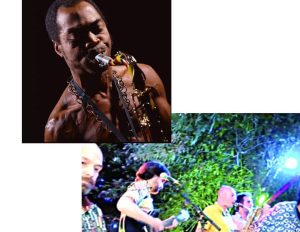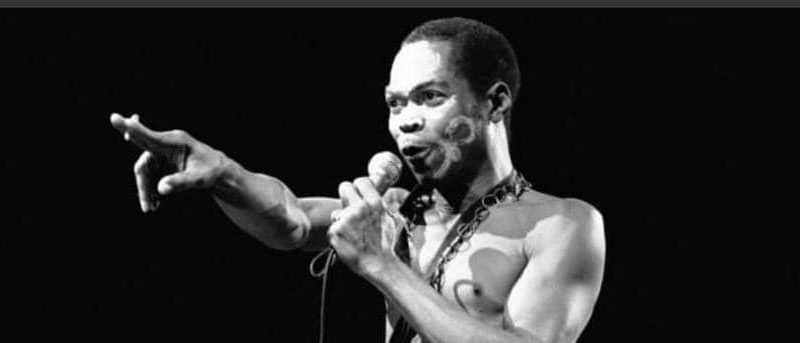Commentary
Afrobeat, a genre born out of Nigeria’s rich musical heritage, has gained widespread recognition and acclaim globally, particularly in the Western world. Ironically, despite its origins and deep roots in Nigerian culture, Afrobeat has found more fervent fans and achieved greater commercial success abroad than in its country of origin. This phenomenon raises intriguing questions about the dynamics of musical trends, cultural exchange, and the complex interplay between local and global influences.This paradox of Afrobeat as a sound that originates from Africa but enjoys Western Spotlight informs this commentary from two of Nigeria’s leading culture custodians, Pelu Awofeso and Yinka Olatunbosun.
My dear Nigerians,
I think we’re going to lose Afrobeat to the West, sooner or later.And by that, I mean the Afrobeat that Fela started and nurtured here in Lagos and has now become a global movement.
The Afrobeat Fela created and cooked on Nigerian soil. Let me explain.
Last Saturday, after leaving Afrobeat Rebellion, I stopped over at Freedom Park, which hosts parallel concerts during Felabration. I arrived just as a swiss group called Kalakuta Mentality (pictured) were rounding off their performance on the main stage, thrilling the audience.
This is a full band ooo, with members playing instruments — trumpet, saxophone, guitar and so on.
I watched them perform “Zombie” and a number of Fela’s popular songs. They sang the lyrics, but of course the pidgin didn’t sound like Fela’s pidgin, Naija pidgin, and that’s understandable.
And right there, my mind flashed back to some seven or eight years ago, when I watched another Afrobeat band called Newen Afrobeat, perform at the New Afrika Shrine, in Ikeja. (I have their album, by the way)
They performed some of Fela’s songs, just like Afrobeat Mentality was doing this fateful Saturday evening.
Then I asked myself: aside from the Kuti clan, how many other bands in Nigeria play Afrobeat?
I mean youthful bands.
Ten to twenty years from now, how many bands in Nigeria would be playing Afrobeat?
I don’t mean Afrobeats — the kind that Davido, Whizkid, Burna Boy and the likes are playing.
To be clear, I love these guys and I enjoy their music a lot. They have given us superb entertainment and put our dear country on the global map.
But my concern in this post is the future of Afrobeat.
The way I see it, in the future more bands in the West would emerge, colonise the genre and dictate how the world listens to and appreciate Afrobeat, a musical genre birthed here in Naija.
Never mind that their pidgin won’t be as authentic. They will still pull the fans, in their hundreds of thousands.
And so na Abroad people go dey propagate the gospel of Afrobeat. Then our young musicians will be singing studio-enhanced afrobeats, because they can’t be bothered to learn how to play any instruments.
The music would evolve. They will add salt, pepper and palm oil and there would be a different kind of Afrobeat, fine tuned and re-calibrated for fans in the West.
And I can bet that we would pay to watch them bring that reinvented music to us here, on African soil.
– Pelu Awofeso is a winner of the CNN/Multichoice African Journalists Awards in the Tourism Category.

Top: Fela
Bottom: Roforofo Jazz
After reading this commentary- originally a Facebook post- by Pelu Awofeso on Afrobeat’s transmutation or whatever a Professor Wole Soyinka might like to describe it, I couldn’t help but entertain a flashback on when the seven-piece music band from Paris, Roforofo Jazz made a Lagos visit. The group was invited in October 2019 to Nigeria by the Fela Kuti family to participate in the Felabration, the annual music tribute to the inventor of afrobeat, Fela Anikulapo-Kuti. Roforofo Jazz was formed by Martin Smith, an afrobeat activist and member of Les Frères Smith, and features vocalist MC Days. The band blends afrobeat with hip hop, funk, and jazz, and was formed after Smith’s experience with Les Frères Smith.
While the idea of exporting Afrobeat to the works is ingenious, the thought of losing it completely to the west stares us all in the face. The rise in the popularity of Afrobeats across the world has inadvertently muffed the Afrobeat sound created by Fela- only heard by some elite music connoisseurs in our time. While many draw inspiration- and even sample from Fela’s classics, the need to market commercial music seems more like a priority to not just Nigerian musicians but the big players in the global music ecosystem. RocNation, owned by Jay-Z, would rather sign Ayra Starr on the label than being bothered to set up a collaboration between Femi Kuti and Kendrick Lamar; even though both have a lot in common in their ideologies and shared similar appetite for vocalising social realities. Just saying.
Afrobeat was never created to be a commercial music as a matter of fact, it was a conscious departure from the popular genres like jazz and highlife. Remember Fela was Nigeria’s first artist to record a full jazz album. And he could well be munching on his sales from the highlife era- his ‘onidodo’ and ‘oni moin moin’ but he kept it real- gagging the government with his conscious music and exposing their weaknesses in his commentaries. Fela’s secret ingredient in the making of Afrobeat is the worst kept music secret: activism. That’s why any artist who ventures into Afrobeat should know it’s “roforofo terrain,” muddy due to the challenges on the way to promoting such music. Airplays will suffer. DJs won’t touch it at the clubs. Only indie streaming sites will favour you. The censorship against Afrobeat has outlived its creator. When was the last time someone played Fela’s scathing “Zombie” on the radio? That’s because the message is as lethal as when it was first released over 40 years ago.
While some of the young artists from Nigeria have tried to use their music platforms to do what a Fela would do, those songs become the most unpopular in their portfolio. Check out Burna Boy. He hasn’t killed the activism part of his music despite the commercial success. But will he give up his ‘Burberry’ lifestyle to blow the horns against bag governance on a daily basis and watch his band disintegrate without sufficient funds? Nah. It’s not going to happen in this generation. Until we find a formula that will keep the artist afloat materially while he makes his unpopular views global using unpopular music, then we would have to keep watching Afrobeat performances from the windows of foreign auditoriums and importing it into Nigeria from western bands.
– Yinka Olatunbosun is a culture journalist and 2018 African recipient of NRW Kultur Sekretariat Grant for Music Research.


















